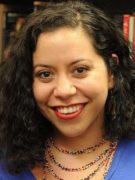A Corrido for Macondo
1. There was a table.
Around the table, there were women and men and people who entered rooms holding their hearts in their hands. Around the table, people sat and they brought with them stories or words that would make stories, parts of little poems, thorns, and parts of their hands that would tremble with the long limbs of sentences or syllables that would grow into lilts. It was a table where so many things began.
The sound of a story happening inside a body is a marvel not everyone has witnessed. Or a poem. But shouldn’t we all be allowed a little bit of sound, a bit of that good light, if not all of it, if not a heap or a whole feast?
A table with pencils and loose paper, journals, books, and voices growing feathers, making themselves into old plumes. I imagine it like this. Laughter and coraje, Love and the naming of despair. I imagine so many things, but is imagining enough to mean realness, to mean wood and feathers and pencils and hair?? A caserola teeming with yeses when the belly has unpacked its nos is a hope I can hold in between my teeth or my hands, both of which Macondo has affirmed that I need for writing, though I could not see myself at that first Macondo table, not because I didn’t belong, not because I did not have anything meaningful to say. Others had to come before me so that my tongue could understand its own fire—I’ve learned that much about fire.
So, I figure one day my words, too, will play ancestor for those yet to be born.
Like all precious things, it began from need, this space for people like us to sit and be heard, to ask questions, to let our questions breathe light, and perhaps we left only with more questions, if not simple answers, perhaps we left knowing how to ask more questions and why and how we belonged, these bodies we are in, these stories our bodies wear like hair.
2.
There was a table made of wood.
Strong, handmade piece of furniture,
that was not only furniture,
but a sacred gathering place.
There were men and women, but I
was not there. Not because I had
nothing to place on the mantel,
salty and steaming like fat tears,
but because I still had too much
to consume. At the first meeting
the table was decorated
with cazuelas, pitchers, platos,
a bright rainbow of ceramics
hugging carefully cooked dishes
flavored with laughter, trauma, grief,
and joy, a legacy of joy.
The table is a metaphor
for family and the elders
who cared for the young. I was fed
from this table like a young doe,
but now, I am grown with my hand
on the back of a wood-carved seat.
The men and women have made room
for us, my brothers and sisters
and me. We are smiling. They say,
“Por favor, come! Sit! Share with us.”
Shy, I offer my meager dish:
nopales boiled, sliced into strips,
and mixed with red diced tomatoes,
purple onions and cilantro.
I make it like my grandmother
taught me, but I am embarrassed.
Nopales are not exciting
or new. No importa. They ask,
“Will you speak your grandmother’s name?”
“Ubalda Duran Bermejo,”
I share. And together we call,
“Ubalda Duran Bermejo,
Presente!” And I know this place,
this strong, handmade table is home.
3. Then, too, there is a tiny red bird.
And of course, of course, I will tell you there is something to wield when we gather. I won’t tell you its dimensions, not its dim textures or songs. Perhaps you already understand that you don’t have to hold something in your palm to believe in its magic. In this life, everyone should know a place where we feel we belong, a place where new parts and old ones, too, are born and reborn.
About fire, I will say this: the saddest thing is when it has to leave, or you do. O, where do I begin?
And look, I cannot solve my loneliness alone. I cannot write anything that is built of rock and wind and feathered, of water, and fire, of course, of course, unless we speak their names. A few days of sitting at the table has helped me realize this now: tomorrow I will be someone’s ancestor, and so will you. It’s a fact that is written in our muscles, breath, and hair.
In any case, Love is a feast, a whole feast, a feast that begins with what we have lost and ends with what we give the world in return.
In any case, there, too, is that tiny red bird. And what did the poet tell us it meant? Again, what did she say its red feathers and tiny heartbeat could do with the trees, the montes, the winds?
4.
Remember the tiny red bird?
Like the table, it is fleeting.
Not to say it is frivolous,
but of a single, bright moment,
a sound home we create again
and again, but never live in.
Feathers cling to our fingertips
like magic so not to forget.
The summer of 2016
we were each a tiny red bird
nursing broken wings, silenced songs,
violated nests, but the fire
smoldered beneath plumes, and refused
to die. Is the tiny red bird
his fragility, her spirit,
or their ability to fly?
Is Macondo the tree we took
refuge in when the summer winds
grew too hot, too violent? Surely,
we found comfort in its branches.
We thanked it for embracing us
like a mother, raising us up.
Surely, we blessed the mothers too
for caring and giving too much.
I cannot solve my loneliness
alone. Alone a spider knits
a web trying her best to live,
but then the leaf, branch, wall and sun.
One day, I too will be a branch.
That is to say, we are the tree,
ancestors to those not yet born,
tiny red birds looking for rest.
5. Imagine holding Love in your hand like a bone.
Of every place I have been: leaf spiders and tree walls, the fingertips of feathers and moonlight, mesquite songs—
In the meantime, I can sit next to a woman whose poems remind me I am supposed to be alive. I carry tierra in my mouth, not because I am meant to suffer, not because I am made to eat mud, but because there is a tree inside me, which the table, which the people holding their hearts in their hands, help me allow to be a tree, which means it will release its saps, which means its roots will touch the earth and remember humming of the sun.
In other words, I can sit next to a woman who wields a machete and not be afraid.
In other words, if I open my mouth, some will see feathers. Red ones and wing-flap and moonlight and hard dust.
And so, I have a bone in my throat, which arises out of lust and sadness and great dark joys, and of course, of course, Love. Everything, after a certain point, means feast and birth and darkness, fire and hair.
And so, I have the urge to tell you I am struck by the magic. The great mercy of Love is telling ourselves we are good enough. It is the same when I hold a man or you hold a woman or we are held by someone with Love. Most enjoyable is the urge not to leave. Most enjoyable is the fact we belong.
6.
Find a bone in the poet’s throat,
you will see the tender scarring.
Find the little part of poems like thorns
cutting and clinging to the skin,
and you will see my heart. My heart
wants to wield the bone tearing at
my insides, but I am fatigued
from all the scratching and bleeding.
To be a poet is to be
muscle movement, deep breath and hair.
Together we gather the hairs
like thread and weave a great blanket
of colors that stretch a rainbow.
Embedded tight in the knots, stars
or pieces of glitter shimmer,
and we remember we are light.
We remember light is love is
love is love is love is love is
to be good enough is to be.
We is made of you and me. Breathe.
Breathe. Breathe. Breathe. Breathe.
Gather strength, collect provisions,
and prepare for the next battle.
Find the poet, the warrior.
 Joe Jiménez is the author of The Possibilities of Mud (Korima 2014) and Bloodline (Arte Público 2016). Jiménez is the recipient of the 2016 Letras Latinas/ Red Hen Press Poetry Prize. His writing has recently appeared in Entropy, Drunken Boat, Atticus Review, and on the PBS NewsHour and Lambda Literary sites. He lives in San Antonio, Texas, and is a member of the Macondo Writing Workshops. For more information, visit joejimenez.net.
Joe Jiménez is the author of The Possibilities of Mud (Korima 2014) and Bloodline (Arte Público 2016). Jiménez is the recipient of the 2016 Letras Latinas/ Red Hen Press Poetry Prize. His writing has recently appeared in Entropy, Drunken Boat, Atticus Review, and on the PBS NewsHour and Lambda Literary sites. He lives in San Antonio, Texas, and is a member of the Macondo Writing Workshops. For more information, visit joejimenez.net.
Xochitl-Julisa Bermejo is the author of Posada: Offerings of Witness and Refuge (Sundress, 2016), a 2016-2017 Steinbeck Fellow, former Poets & Writers California Writers Exchange winner, and Barbara Deming Memorial Fund grantee. She’s received residencies from Hedgebrook and Ragdale Foundation and is a member of the Macondo Writers’ Workshop. Her work is published in Acentos Review, CALYX, crazyhorse, and The James Franco Review among others. A short dramatization of her poem “Our Lady of the Water Gallons,” directed by Jesús Salvador Treviño, can be viewed at latinopia.com. She is a cofounder of Women Who Submit and the curator of HITCHED.
.





